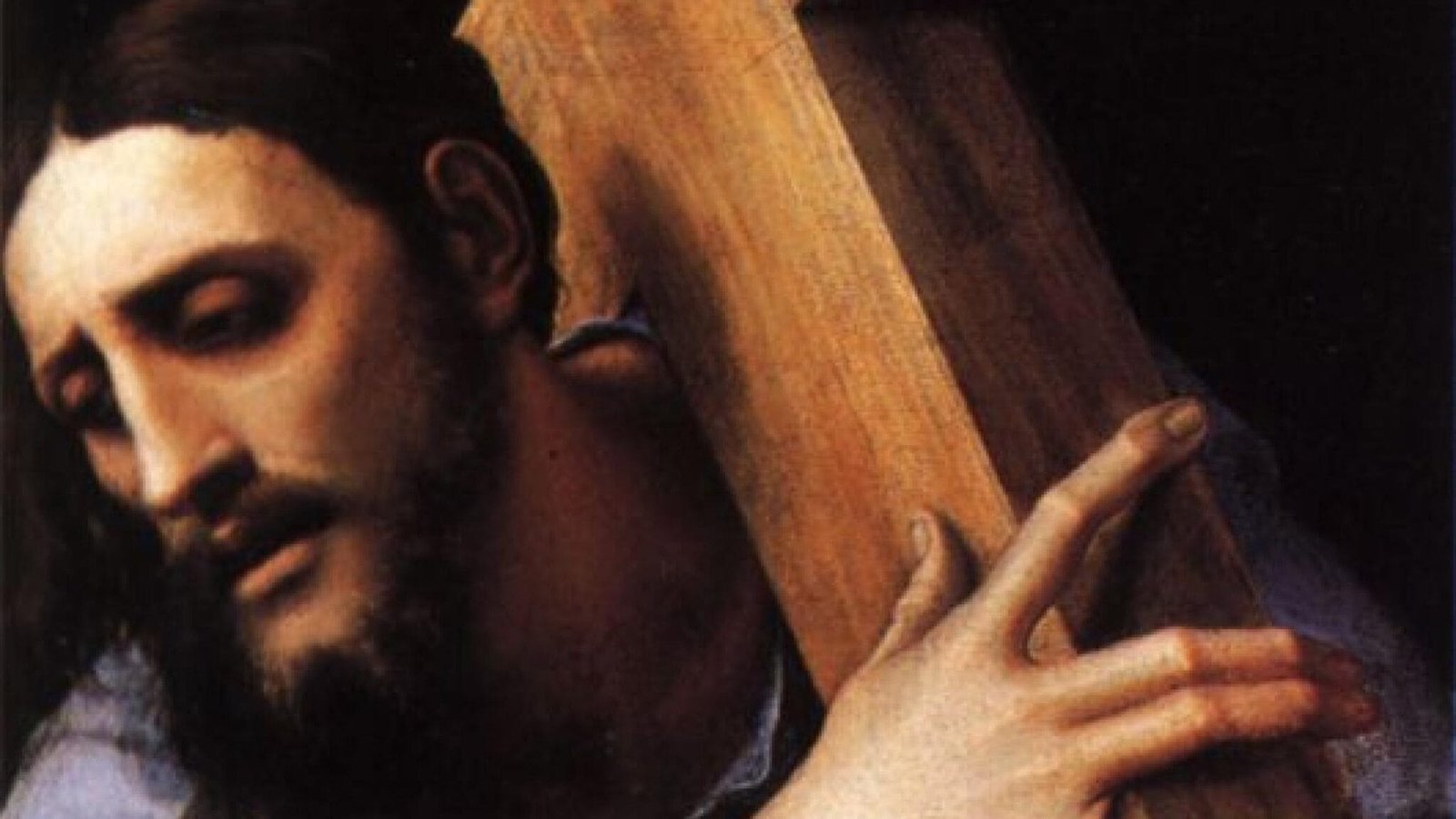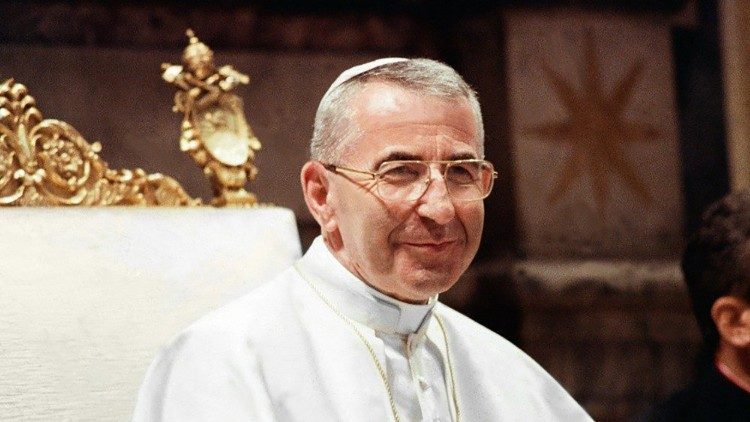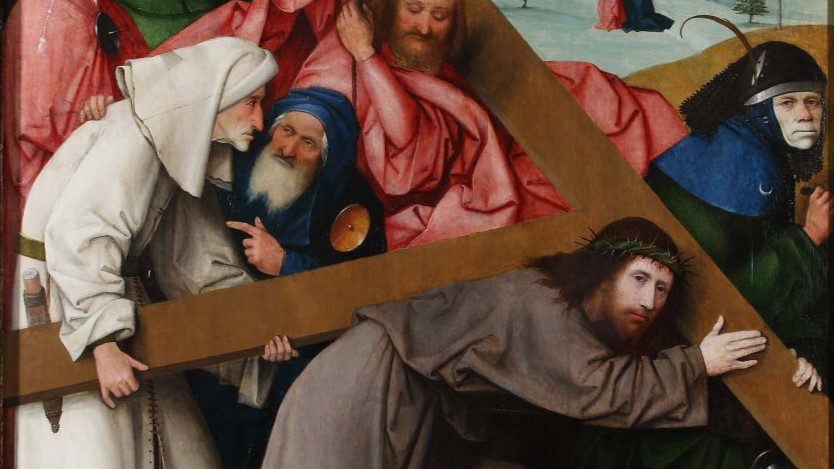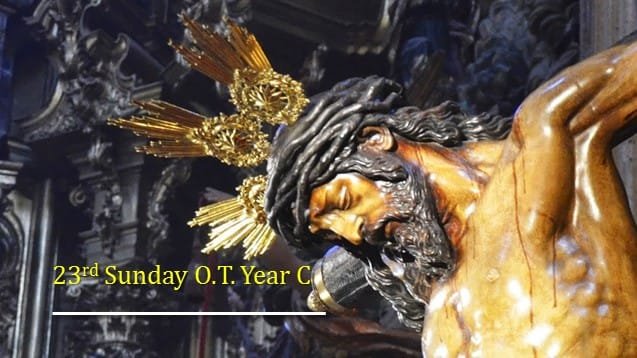POPE FRANCIS ON THE 23RD SUNDAY IN ORDINARY TIME C

HOMILY OF HIS HOLINESS POPE FRANCIS
Saint Peter’s Square
23rd Sunday in Ordinary Time C – Sunday, 4 September 2022
______________________________________
Jesus is making his way to Jerusalem, and today’s Gospel tells us that “large crowds were travelling with him” (Lk 24:25). To travel with Jesus means to follow him, to become his disciples. Yet, the Lord’s message to those people was not exactly appealing; in fact, it was quite demanding: whoever does not love him more than his or her own family, whoever does not carry the cross, whoever remains attached to earthly goods, cannot be his disciple (cf. vv. 26-27.33). Why does Jesus say these things to the crowds? What do these admonitions mean? Let us try to answer these questions.
First, we see a great crowd of people following Jesus. We can imagine that many were attracted by his words, astonished at the things he did, and saw him as a source of hope for the future. What would any teacher of that time or, for that matter, what would any astute leader do, seeing that his or her words and charisma attract crowds and increase his or her popularity? The same thing happens today, at times of personal or societal crisis, when we are especially prey to feelings of anger or we fear things that threaten our future. We become more susceptible and thus, on the tide of emotion, we look to those who can shrewdly take advantage of the situation, profiting from society’s fears and promising to be the “saviour” who can solve all its problems, whereas in reality they are looking for wider approval and for greater power, based on the impression they make, their ability to have things in hand.
The Gospel tells us that this is not Jesus’ way. God’s style is different. It is important to understand God’s style, how he acts. God acts according to a style, and God’s style is different from that of certain people, since he does not exploit our needs or use our vulnerability for his own aggrandizement. He does not want to seduce us with deceptive promises or to distribute cheap favours; he is not interested in huge crowds. He is not obsessed with numbers; he does not seek approval; he does not idolize personal success. On the contrary, he seems to be worried when people follow him with giddy excitement and enthusiasm. As a result, instead of yielding to the allure of popularity – for popularity is alluring – he asks each person to discern carefully their reason for following him and the consequences that it will entail. For many in those crowds might have been following Jesus because they hoped he would be a leader who could set them free from their enemies, someone who, once in power, could share that power with them, or someone who by performing miracles could make hunger and disease disappear. We can follow the Lord for any number of reasons. Some of these, it must be acknowledged, are worldly. A perfect religious exterior can serve to hide the mere satisfaction of one’s own needs, the quest of personal prestige, the desire for a certain social status or to keep things under control, the thirst for power and privilege, the desire for recognition and so on. This happens even nowadays among Christians. Yet that is not the style of Jesus. That cannot be the style of his disciples and of his Church. If anyone follows Jesus with this kind of self-interest, he or she has taken the wrong path.
The Lord demands a different attitude. To follow him does not mean to become part of a court or a triumphal procession, or even to receive a lifetime insurance policy. On the contrary, it means “carrying one’s cross” (Lk 14:27): shouldering, like him, one’s own burdens and those of others, making one’s life a gift, not a possession, spending it in imitation of his own generous and merciful love for us. These are decisions that engage the totality of our lives. For this reason, Jesus desires that his disciples prefer nothing to this love, even their deepest affections and greatest treasures.

To do this, we need to look to him more than to ourselves, to learn how to love, and to learn this from the Crucified One. In him, we see the love that bestows itself to the very end, without measure and without limits. The measure of love is to love without measure. In the words of Pope John Paul, “we are the objects of undying love on the part of God” (Angelus, 10 September 1978). An undying love: it never sinks beneath the horizon of our lives; it shines upon us and illumines even our darkest nights. When we gaze upon the Crucified Lord, we are called to the heights of that love, to be purified of our distorted ideas of God and of our self-absorption, and to love God and others, in Church and society, including those who do not see things as we do, to love even our enemies.
To love even at the cost of sacrifice, silence, misunderstanding, solitude, resistance and persecution. To love in this way, even at this price, because, as Blessed John Paul I also said, if you want to kiss Jesus crucified, “you cannot help bending over the cross and letting yourself be pricked by a few thorns of the crown on the Lord’s head” (General Audience, 27 September 1978). A love that perseveres to the end, thorns and all: no leaving things half done, no cutting corners, no fleeing difficulties. If we fail to aim high, if we refuse to take risks, if we content ourselves with a watered-down faith, we are, as Jesus says, like those who want to build a tower but do not estimate the cost; they “lay the foundations”, but then are “not able to finish the work” (v. 29). If the fear of losing ourselves makes us stop giving ourselves, we leave things undone: our relationships and work, our responsibilities and commitments, our dreams and even our faith. And then we end up living life halfway – and how many people live life halfway, and we also frequently are tempted to live life halfway – without ever taking the decisive step – this is what it means to live life halfway – without ever taking flight, without ever taking risks for the good, and without ever truly committing ourselves to helping others. Jesus asks us precisely this: live the Gospel and you will live your life, not halfway but to the full. Live the Gospel, live life, with no compromises.
Dear brothers and sisters, our new Blessed lived that way: in the joy of the Gospel, without compromises, loving to the very end. He embodied the poverty of the disciple, which is not only detachment from material goods, but also victory over the temptation to put oneself at the centre, to seek one’s own glory. On the contrary, following the example of Jesus, he was a meek and humble pastor. He thought of himself as dust on which God deigned to write (cf. A. LUCIANI/JOHN PAUL I, Opera Omnia, Padua, 1988, vol. II, 11). That is why he could say: “The Lord recommended it so much: be humble. Even if you have done great things, say: ‘We are useless servants’” (General Audience, 6 September 1978).
With a smile, Pope John Paul managed to communicate the goodness of the Lord. How beautiful is a Church with a happy, serene and smiling face, a Church that never closes doors, never hardens hearts, never complains or harbours resentment, does not grow angry or impatient, does not look dour or suffer nostalgia for the past, falling into an attitude of going backwards. Let us pray to him, our father and our brother, and ask him to obtain for us “the smile of the soul”, a transparent smile that does not deceive, the smile of the soul. Let us pray, in his own words: “Lord take me as I am, with my defects, with my shortcomings, but make me become what you want me to be” (General Audience, 13 September 1978). Amen.
Source: https://www.vatican.va/content/francesco/en/homilies/2022/documents/20220904-omelia-beatificazione-gpi.html
Emphasis mine.
HOMILY OF HIS HOLINESS
Soamandrakizay diocesan field (Antananarivo)
Homily 23rd Sunday in Ordinary Time C, 8 September 2019
The Gospel tells us that “great multitudes accompanied Jesus” (Lk 14:25). Like the multitudes gathered along his path, you too have come in great numbers to receive his message and follow in his footsteps. But you also know that following Jesus is not easy. You haven’t had much rest, and many of you have even spent the night here. Today, Luke’s Gospel reminds us of how demanding that commitment can be.
We should realize that Luke sets out those demands within his account of Jesus’ ascent to Jerusalem. He starts with the parable of the banquet to which everyone is invited, especially the outcasts living on the streets, in the squares and at the crossroads. And he concludes with the three “parables of mercy”, where a party is celebrated when what was lost was found, where someone who seemed dead is welcomed with joy and restored to life with the possibility of making a new start. For us as Christians, our sacrifices only make sense in the light of the joyful celebration of our encounter with Jesus Christ.
Jesus’ first demand has to do with family relationships. The new life the Lord holds out to us seems troubling and scandalously unjust to those who think that entry into the kingdom of heaven can be limited or reduced only to bonds of blood or membership in a particular group, clan or particular culture. When “family” becomes the decisive criterion for what we consider right and good, we end up justifying and even “consecrating” practices that lead to the culture of privilege and exclusion: favouritism, patronage and, as a consequence, corruption. The Master demands that we see beyond this. He says this clearly: anyone incapable of seeing others as brothers or sisters, of showing sensitivity to their lives and situations regardless of their family, cultural or social background “cannot be my disciple” (Lk 14:26). His devoted love is a free gift given to all and meant for all.
Jesus’ second demand shows us how hard it is to follow him if we seek to identify the kingdom of heaven with our personal agenda or our attachment to an ideology that would abuse the name of God or of religion to justify acts of violence, segregation and even murder, exile, terrorism and marginalization. This demand encourages us not to dilute and narrow the Gospel message, but instead to build history in fraternity and solidarity, in complete respect for the earth and its gifts, as opposed to any form of exploitation. It encourages us to practise “dialogue as the path; mutual cooperation as the code of conduct; reciprocal understanding as the method and standard” (Document on Human Fraternity, Abu Dhabi, 4 February 2019). And not to be tempted by teachings that fail to see that the wheat and the chaff must grow together until the return of the Master of the harvest (cf. Mt 13:24-30).
Finally, how difficult it can be to share the new life that the Lord offers us when we are continually driven to self-justification, because we think that everything depends exclusively on our efforts and resources! Or, as we heard in the first reading, when the race to amass possessions becomes stifling and overwhelming, which only increases our selfishness and our willingness to use immoral means. Jesus’ demand is that we rediscover how to be grateful and to realize that, much more than a personal triumph, our life and our talents are the fruit of a gift (cf. Gaudete et Exsultate, 55), a gift created by God through the silent interplay of so many people whose names we will only know in the kingdom of heaven.
With these three demands, the Lord wants to prepare his disciples for the celebration of the coming of the kingdom of God, and to free them from the grave obstacle that, in the end, is one of the worst forms of enslavement: living only for oneself. It is the temptation to fall back into our little universe, and it ends up leaving little room for other people. The poor no longer enter in, we no longer hear the voice of God, we no longer enjoy the quiet joy of his love, we are no longer eager to do good… Many people, by shutting themselves up in this way, can feel “apparently” secure, yet they end up becoming bitter, querulous and lifeless. This is no way to live a full and dignified life; it is not God’s will for us, nor is it the life in the Spirit that has its source in the heart of the risen Christ (cf. Evangelii Gaudium, 2).
With these demands, the Lord, as he walks towards Jerusalem, asks us to lift our gaze, to adjust our priorities and, above all, to make room for God to be the centre and axis of our life.
As we look around us, how many men and women, young people and children are suffering and in utter need! This is not part of God’s plan. How urgently Jesus calls us to die to our self-centredness, our individualism and our pride! In this way, we can allow the spirit of fraternity to triumph – a spirit born from the pierced side of Jesus Christ, in which we are born as God’s family – and in which everyone can feel loved because understood, accepted and appreciated in his or her dignity. “In the face of contempt for human dignity, we often remain with arms folded or stretched out as a sign of our frustration before the grim power of evil. Yet we Christians cannot stand with arms folded in indifference, or with arms outstretched in helplessness. No. As believers, we must stretch out our hands, as Jesus does with us” (Homily for the World Day of the Poor, 18 November 2018).
The Word of God that we have just heard bids us set out once more, daring to take this qualitative leap and to adopt this wisdom of personal detachment as the basis for social justice and for our personal lives. Together we can resist all those forms of idolatry that make us think only of the deceptive securities of power, career, money and of the search for human glory.
The demands that Jesus sets before us cease to be burdensome as soon as we begin to taste the joy of the new life that he himself sets before us. It is the joy born of knowing that he is the first to seek us at the crossroads, even when we are lost like the sheep or the prodigal son. May this humble realism – it is a realism, a Christian realism – inspire us to take on great challenges and give you the desire to make your beautiful country a place where the Gospel becomes life, and where life is for the greater glory of God.
Let us commit ourselves and let us make the Lord’s plans our own.
Source: https://www.vatican.va/content/francesco/en/homilies/2019/documents/papa-francesco_20190908_omelia-madagascar.html
Emphasis mine

HOMILY OF HIS HOLINESS POPE FRANCIS
Saint Peter’s Square
Homily 23rd Sunday in Ordinary Time C, 4 September 2016
“Who can learn the counsel of God?” (Wis 9:13). This question from the Book of Wisdom that we have just heard in the first reading suggests that our life is a mystery and that we do not possess the key to understanding it. There are always two protagonists in history: God and man. Our task is to perceive the call of God and then to do his will. But in order to do his will, we must ask ourselves, “What is God’s will in my life?”
We find the answer in the same passage of the Book of Wisdom: “People were taught what pleases you” (Wis 9:18). In order to ascertain the call of God, we must ask ourselves and understand what pleases God. On many occasions the prophets proclaimed what was pleasing to God. Their message found a wonderful synthesis in the words “I want mercy, not sacrifice” (Hos 6:6; Mt 9:13). God is pleased by every act of mercy, because in the brother or sister that we assist, we recognize the face of God which no one can see (cf. Jn 1:18). Each time we bend down to the needs of our brothers and sisters, we give Jesus something to eat and drink; we clothe, we help, and we visit the Son of God (cf. Mt 25:40). In a word, we touch the flesh of Christ.
We are thus called to translate into concrete acts that which we invoke in prayer and profess in faith. There is no alternative to charity: those who put themselves at the service of others, even when they don’t know it, are those who love God (cf. 1 Jn 3:16-18; Jas 2:14-18). The Christian life, however, is not merely extending a hand in times of need. If it is just this, it can be, certainly, a lovely expression of human solidarity which offers immediate benefits, but it is sterile because it lacks roots. The task which the Lord gives us, on the contrary, is the vocation to charity in which each of Christ’s disciples puts his or her entire life at his service, so to grow each day in love.
We heard in the Gospel, “Large crowds were travelling with Jesus” (Lk 14:25). Today, this “large crowd” is seen in the great number of volunteers who have come together for the Jubilee of Mercy. You are that crowd who follows the Master and who makes visible his concrete love for each person. I repeat to you the words of the Apostle Paul: “I have indeed received much joy and comfort from your love, because the hearts of the saints have been refreshed through you” (Philem 1:7). How many hearts have been comforted by volunteers! How many hands they have held; how many tears they have wiped away; how much love has been poured out in hidden, humble and selfless service! This praiseworthy service gives voice to the faith – it gives voice to the faith! – and expresses the mercy of the Father, who draws near to those in need.
Following Jesus is a serious task, and, at the same time, one filled with joy; it takes a certain daring and courage to recognize the divine Master in the poorest of the poor and those who are cast aside, and to give oneself in their service. In order to do so, volunteers, who out of love of Jesus serve the poor and the needy, do not expect any thanks or recompense; rather they renounce all this because they have discovered true love. And each one of us can say: “Just as the Lord has come to meet me and has stooped down to my level in my hour of need, so too do I go to meet him, bending low before those who have lost faith or who live as though God did not exist, before young people without values or ideals, before families in crisis, before the ill and the imprisoned, before refugees and immigrants, before the weak and defenceless in body and spirit, before abandoned children, before the elderly who are on their own. Wherever someone is reaching out, asking for a helping hand in order to get up, this is where our presence – and the presence of the Church which sustains and offers hope – must be”. And I do this, keeping alive the memory of those times when the Lord’s hand reached out to me when I was in need.
Mother Teresa, in all aspects of her life, was a generous dispenser of divine mercy, making herself available for everyone through her welcome and defence of human life, those unborn and those abandoned and discarded. She was committed to defending life, ceaselessly proclaiming that “the unborn are the weakest, the smallest, the most vulnerable”. She bowed down before those who were spent, left to die on the side of the road, seeing in them their God-given dignity; she made her voice heard before the powers of this world, so that they might recognize their guilt for the crime – the crimes! – of poverty they created. For Mother Teresa, mercy was the “salt” which gave flavour to her work, it was the “light” which shone in the darkness of the many who no longer had tears to shed for their poverty and suffering.
Her mission to the urban and existential peripheries remains for us today an eloquent witness to God’s closeness to the poorest of the poor. Today, I pass on this emblematic figure of womanhood and of consecrated life to the whole world of volunteers: may she be your model of holiness! I think, perhaps, we may have some difficult in calling her “Saint Teresa”: her holiness is so near to us, so tender and so fruitful that we continual to spontaneously call her “Mother Teresa”. May this tireless worker of mercy help us increasingly to understand that our only criterion for action is gratuitous love, free from every ideology and all obligations, offered freely to everyone without distinction of language, culture, race or religion. Mother Teresa loved to say, “Perhaps I don’t speak their language, but I can smile”. Let us carry her smile in our hearts and give it to those whom we meet along our journey, especially those who suffer. In this way, we will open up opportunities of joy and hope for our many brothers and sisters who are discouraged and who stand in need of understanding and tenderness.
Source: https://www.vatican.va/content/francesco/en/homilies/2016/documents/papa-francesco_20160904_omelia-canonizzazione-madre-teresa.html
Emphasis mine.

ANGELUS
Saint Peter’s Square
Sunday, 8 September 2013
Dear Brothers and Sisters,
Good morning! In today’s Gospel Jesus insists on the conditions for being his disciples: preferring nothing to the love of Christ, carrying one’s cross and following him. Many people in fact drew near to Jesus, they wanted to be included among his followers; and this would happen especially after some miraculous sign which accredited him as the Messiah, the King of Israel. However Jesus did not want to disappoint anyone. He knew well what awaited him in Jerusalem and which path the Father was asking him to take: it was the Way of the Cross, the way of sacrificing himself for the forgiveness of our sins. Following Jesus does not mean taking part in a triumphal procession! It means sharing his merciful love, entering his great work of mercy for each and every man and for all men. The work of Jesus is, precisely, a work of mercy, a work of forgiveness and of love! Jesus is so full of mercy! And this universal pardon, this mercy, passes through the Cross. Jesus, however, does not want to do this work alone: he wants to involve us too in the mission that the Father entrusted to him. After the Resurrection he was to say to his disciples: “As the Father has sent me, even so I send you”… if you forgive the sins of any, they are forgiven” (Jn 20:21-22). Jesus’ disciple renounces all his possessions because in Jesus he has found the greatest Good in which every other good receives its full value and meaning: family ties, other relationships, work, cultural and economic goods and so forth…. The Christian detaches him or herself from all things and rediscovers all things in the logic of the Gospel, the logic of love and of service.
To explain this requirement, Jesus uses two parables: that of the tower to be built and that of the king going to war. The latter says: “What king, going to encounter another king in war, will not sit down first and take counsel whether he is able with ten thousand to meet him who comes against him with twenty thousand? And if not, while the other is yet a great way off, he sends an embassy and asks terms of peace” (Lk 14:31-32). Jesus does not wish to address the topic of war here; it is only a parable. Yet at this moment in which we are praying intensely for peace, this word of the Lord touches us to the core, and essentially tells us: there is a more profound war that we must all fight! It is the firm and courageous decision to renounce evil and its enticements and to choose the good, ready to pay in person: this is following Christ, this is what taking up our cross means! This profound war against evil! What is the use of waging war, so many wars, if you aren’t capable of waging this profound war against evil? It is pointless! It doesn’t work…. Among other things this war against evil entails saying “no” to the fratricidal hatred and falsehood that are used; saying “no” to violence in all its forms; saying “no” to the proliferation of weapons and to the illegal arms trade. There is so much of it! So much of it! And the doubt always remains: is this war or that war — because wars are everywhere — really a war to solve problems or is it a commercial war for selling weapons in illegal trade? These are the enemies to fight, united and consistent, following no other interests than those of peace and of the common good.
Dear brothers and sisters, today we are also commemorating the Nativity of the Virgin Mary, a Feast particularly dear to the Eastern Churches. And let all of us now send a beautiful greeting to all the brothers, sisters, bishops, monks and nuns of the Eastern Churches, both Orthodox and Catholic, a beautiful greeting! Jesus is the sun, Mary is the dawn that heralds his rising. Yesterday evening we kept vigil, entrusting to her intercession our prayers for peace in the world, especially in Syria and throughout the Middle East. Let us now invoke her as Queen of Peace. Queen of Peace pray for us! Queen of Peace pray for us!
Stay updated: subscribe by email for free TO OUR NEW WEBSITE www.catholicsstrivingforholiness.org (PUT YOUR EMAIL IN THE SUBSCRIBE WIDGET).
We are also in www.fb.com/Catholicsstrivingforholiness. Kindly help more people in their Christian life by liking our page and inviting your family, friends and relatives to do so as well. Thanks in advance and God bless you and your loved ones! Fr. Rolly Arjonillo

